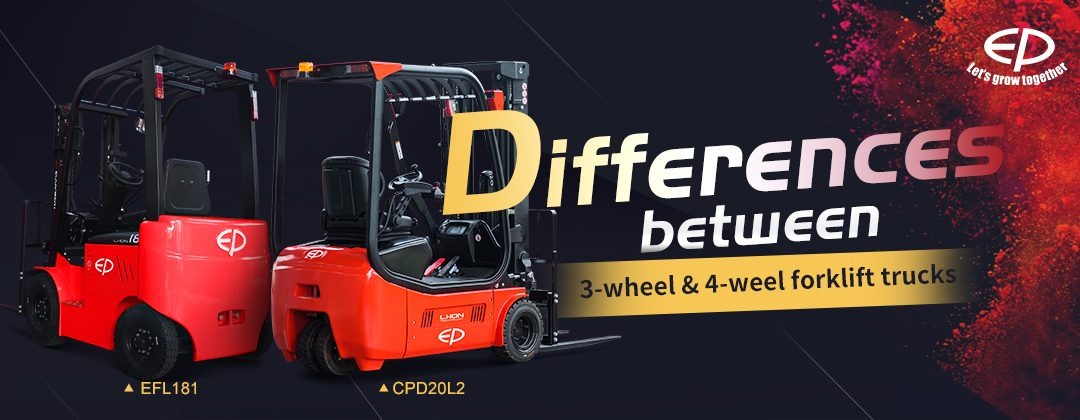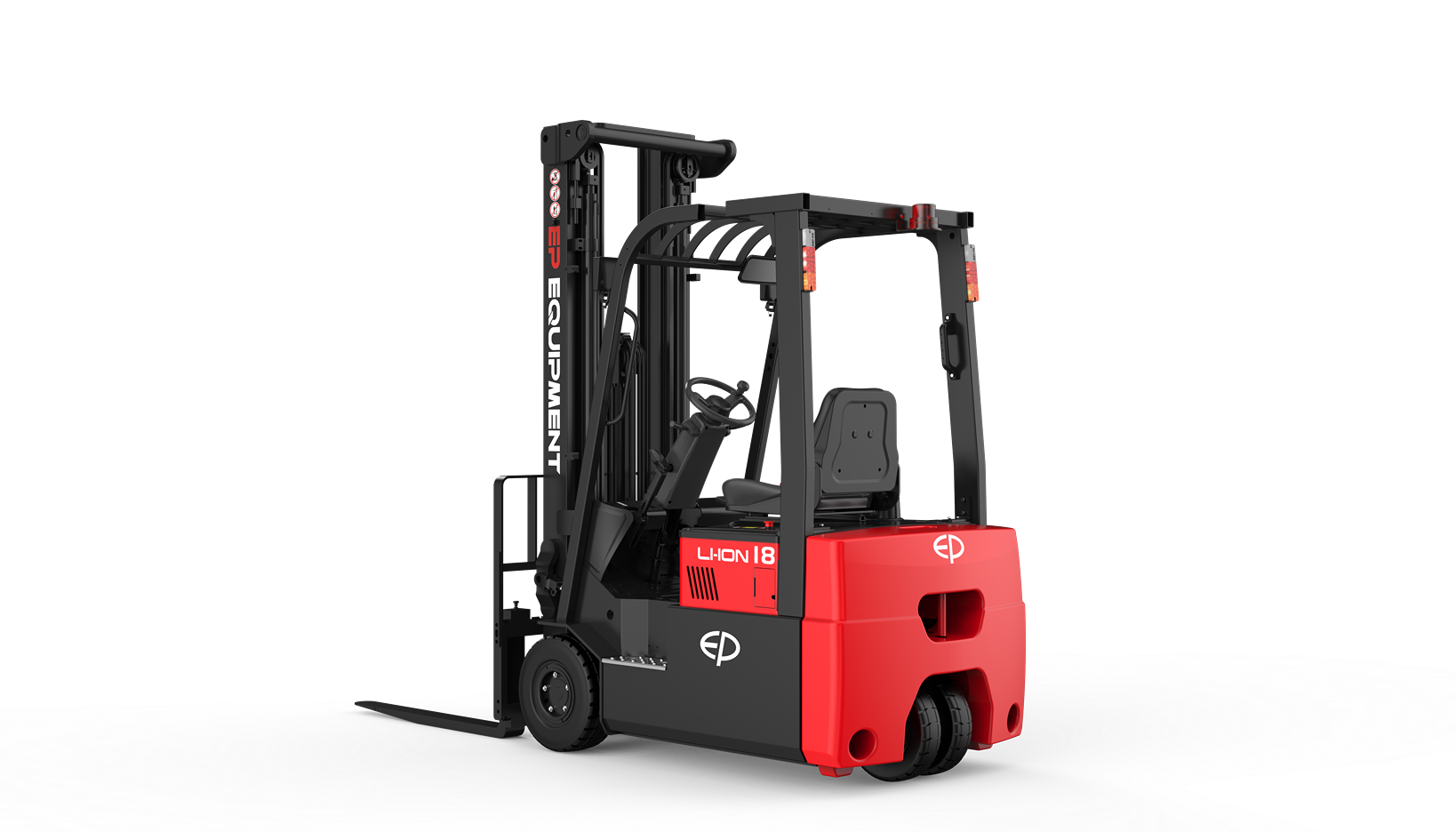Choosing The Right Forklift For Your Business
Productivity, efficiency and practical moving. These are just some benefits of investing in a forklift for your business. Maybe you’re considering upgrading your existing fleet. Or perhaps you’re a new business investing in forklift technology for the first time.
Whatever your reason to take a closer look at the forklifts on offer, the first step to finding the right fit is knowing which type of forklift you need. While choosing between electric and gas-powered is essential, knowing what style of forklift you require in the first place is the ideal place to start.
Forklifts come in two distinct models: 3 wheeled forklifts and 4 wheeled forklifts. As to which is right for your business, we’ve created a full guide to make the decision an easy one. Read on to find out more about the different types of forklifts available – as well as all the information needed to determine which one is the best fit for your business:
What Is A 3-Wheeled Forklift?
As is probably apparent to anyone reading the name, three-wheeled forklifts are forklifts that have three wheels instead of four. 3-wheel forklift trucks are mainly used in warehouse and logistics applications where the compact size of the trucks is favored. Typically, a forklift with three wheels will have two wheels at the front and a solo wheel at the back – a sort of reverse tricycle. This means the extra power is towards the end where lifting and counterbalancing is required, providing a smoother and more effective lift.
The CPD15/18/20TVL is an excellent example of a three-wheeled forklift from the EP product range, with two large tyres at the front and a single wheel in the centre to the rear of the machine.
It also comes with Li-Ion technology, allowing an even more compact size and larger operator space for higher ergonomics.
The Advantages Of Choosing A 3-Wheeled Forklift
One of the most significant advantages to 3-wheel forklifts is that they’re ideally suited for limited space environments. That three-wheel format translates to a smaller turning circle, allowing the forklift to turn in even cramped spaces. For locations that have small storage spaces, a three-wheeled forklift is a perfect way to boost productivity without coming across turning and flexibility issues.
Forklifts with three wheels are very well-suited to working in smooth-floored spaces, and even the electric models are capable of working both indoors and outdoors as and when needed. This means they’re best in warehouses or on a similar concrete floor, ideally suited for their specific niche.
If you want to know more about compact sized forklifts in tight spaces, feel free to read our blog on Best Small Electric Forklifts for Tight Spaces.
Use Cases For 3-Wheeled Forklifts
Plenty of industries could benefit from investing in a three-wheeled forklift. For example, retail and ecommerce businesses with a small warehouse space can benefit from a three-wheel forklift. Because of their turning circle, size and load capacity, indoor settings with narrow aisles and compact racking are where these models shine. They’re uniquely suited to these smaller, smooth spaces, and well worth the investment for businesses with relatively standard lifting and load requirements.
Some industries where 3-wheel forklifts are commonly used include indoor retail and storage warehouses, as well as garden centres, parcel depots and more. They’re also well-suited to building suppliers and home improvement businesses, where quick retrieval of the often heavy stock is required. Flexible, versatile and nippy, three-wheel models have plenty to offer to the right company, including increased productivity.
What Is a 4-Wheeled Forklift?
A 4 wheeled forklift is any forklift that has four distinct wheels included within its design. With the vast majority of other industrial machinery, these four wheels are placed two at the front and two at the back of the forklift.
While there are many varieties of four-wheel forklifts available, they generally all follow this formula to provide as productive and efficient an experience as possible. Four-wheel forklifts often have more heavy-duty equipment and may be built to be more ergonomic for long-term use.
EP includes a range of different 4-wheel forklifts within their broader catalog, one of which is the popular EFL Series. Designed on a smaller scale, with all the functionality of a sizeable four-wheel forklift, this li-ion battery-powered forklift is a space-saving alternative to older, clunkier gas-powered models.
The Advantages Of Choosing A 4-Wheeled Forklift
If you’re looking for greater versatility and freedom in your choice of forklift, then four wheels might be for you. While a three-wheeler isn’t able to navigate rougher surfaces or gravel, a four-wheel model takes it on easily.
For builder’s yards and similar purposes, this makes four wheels a far better choice. Ramps, long distances and uneven surfaces are no challenge for a suitable four-wheel forklift.
The other significant benefit to 4 wheel forklifts is that they are often more powerful. While this does equate to more cost, if you have loads that exceed the capacity of a three-wheel model, then it’s more than worth the investment.
While historically four wheels have led to a far wider turning circle, the gap between the two models is slowly being reduced. While three wheels will always be slightly better in terms of smaller spaces, electric four-wheel forklifts aren’t far off being fully functional for these spaces too.
Use Cases For 4-Wheeled Forklifts
Anywhere that has uneven surfaces, gravel or long-distance moving is ideally suited for a four-wheel forklift machine. These vehicles do best with larger carrying capacities, which makes them well suited to industries such as manufacturing, wholesale and even builder’s yards and construction.
Their hardiness means they’re well-suited to outdoor work, which means they could also be functional for use on farmyards and similar spaces. If your business requires high capacity loads to be moved day in and day out, then a four-wheeler is the workhorse you need.
Four-wheel forklifts are well suited to more high-intensity requirements, especially when it comes to travelling longer routes or even performing varied duties from day to day. Their versatility comes from the ability to traverse a range of surfaces, as well as securely carry awkward loads where they need to go.
For any business, this is hugely beneficial – especially where there’s plenty of space to turn and manoeuvre. For larger retail spaces, or even the moving of white goods and heavy, expensive equipment, a four-wheel forklift is a solid choice.
3 Or 4-wheeled – Which Is Better?
So, is a three-wheel forklift or a 4-wheel model the best fit for your business? That all depends on your exact business requirements, and what you need to forklift to do. While we’ve covered in-depth the main benefits of each type of forklift, the final decision is down to personal choice.
By understanding what you need your forklift to do on an average day, you can better understand which type of forklift is right for you. Do you require something that can work outside in all weathers?
Whichever model you’re considering, for ultimate versatility, opting for an electric forklift is your best bet. Not only does this mean that you can use your forklift indoors safely, but it can also save your business costs in the long run. EP has a wide range of electric forklifts, both with three and four wheels, designed to suit the needs of just about any kind of business. The only challenge is finding the one you like best.
If you’re considering investing in a forklift for your business, talking to the experts is the best way to find a solution that fits you. Contact us today to discuss the range of three and four-wheel forklifts we offer, and we’ll soon find something perfectly suited to your business needs.



